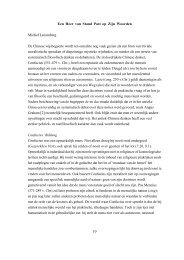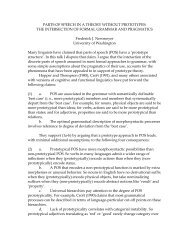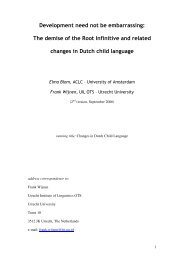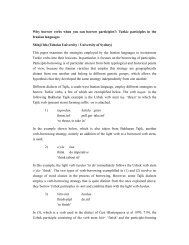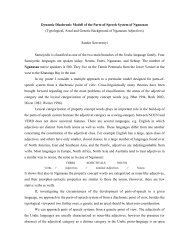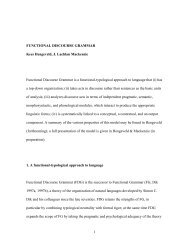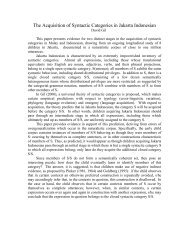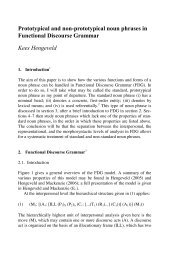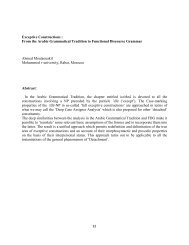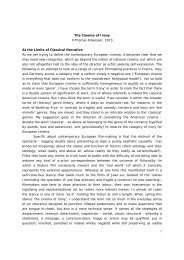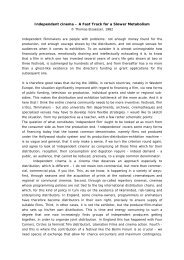The argument structure of deverbal nouns in Brazilian Portuguese
The argument structure of deverbal nouns in Brazilian Portuguese
The argument structure of deverbal nouns in Brazilian Portuguese
You also want an ePaper? Increase the reach of your titles
YUMPU automatically turns print PDFs into web optimized ePapers that Google loves.
(22) dentro d-o aument-o de vencimento-s hav-eria...<br />
<strong>in</strong>side <strong>of</strong>-M raise-NMLZ <strong>of</strong> salary-PL there.be-IND.FUT.IRR.3SG<br />
um-a promo-ção de tod-o o pessoal... (D2-SP-360)<br />
a-F promote-NMLZ <strong>of</strong> all-M the.M staff<br />
‘together with the raise <strong>of</strong> salary there would be... a promotion <strong>of</strong> all the staff’<br />
(23)a. aquilo é um complemento quer dizer<br />
that be.IND.PRS.3SG a.M complement I mean<br />
tudo que v-em é ótimo (D2-SP-360)<br />
everyth<strong>in</strong>g that come-IND.PRS.3SG be.IND.PRS.3SG good<br />
‘that is a complement I mean everyth<strong>in</strong>g com<strong>in</strong>g is good’<br />
b. eu hav:-:ia l-ido um::<br />
I have.AUX-IND.IPFV.1SG read-PTCP a.M<br />
sobre um nov-o método de alfabetiz-ação... (D2-SP-3600 ‘<br />
about a.M new-M method <strong>of</strong> teach.read<strong>in</strong>g-NMLZ<br />
I’ve:: been read a:: someth<strong>in</strong>g about a new method <strong>of</strong> teach<strong>in</strong>g read<strong>in</strong>g...’<br />
c. o teatro é menos acei-t-o pel-o<br />
the.M theater be.IND.PRS.3.SG less accept-PST.PTCP-M by-the.M<br />
público por falta de divulg-ação (DID-SP-234)<br />
public for lack <strong>of</strong> divulge-NMLZ<br />
‘the theater is less accepted by the public because <strong>of</strong> some lack <strong>of</strong> divulgation, right?’<br />
<strong>The</strong> promotion the speaker refers to <strong>in</strong> (22) must be carried through by the<br />
M<strong>in</strong>istry <strong>of</strong> Justice, which determ<strong>in</strong>es the career <strong>of</strong> the state attorney, but the speaker<br />
does not, at that po<strong>in</strong>t <strong>in</strong> the discourse, deem it relevant to mention the agent; a<br />
situation similar to that <strong>of</strong> passive voice constructions like (24a) or other predications<br />
conta<strong>in</strong><strong>in</strong>g an undeterm<strong>in</strong>ed subject, like (24b).<br />
(24)a. O pessoal foi promov-id-o<br />
the.M staff be.IND.PRF.3SG promote-PST.PTCP-M<br />
promov-eu se o pessoal<br />
promote-IND.PRF.3SG REFL the.M staff<br />
‘<strong>The</strong> staff was promoted’<br />
b promov-eram o pessoal.<br />
promote-IND.PRF.3PL the.M staff<br />
‘One promoted the staff’<br />
<strong>The</strong> <strong>deverbal</strong> constructions <strong>in</strong> (23a-c), on the other hand, conta<strong>in</strong> nonreferential<br />
<strong>nouns</strong>, function<strong>in</strong>g as a non-verbal predicate <strong>in</strong> (23a), a modifier PP <strong>in</strong><br />
(23b), and the complement <strong>of</strong> a noun <strong>in</strong> (23c). This means that the noun assigns a<br />
property without referr<strong>in</strong>g, thus provid<strong>in</strong>g only a lexical description <strong>of</strong> a state-<strong>of</strong>affairs.<br />
<strong>The</strong> noun gets close to the status <strong>of</strong> a zero-order entity, the less prototypical<br />
referential category: while referr<strong>in</strong>g to a zero-order expression, this k<strong>in</strong>d <strong>of</strong> <strong>deverbal</strong><br />
14




